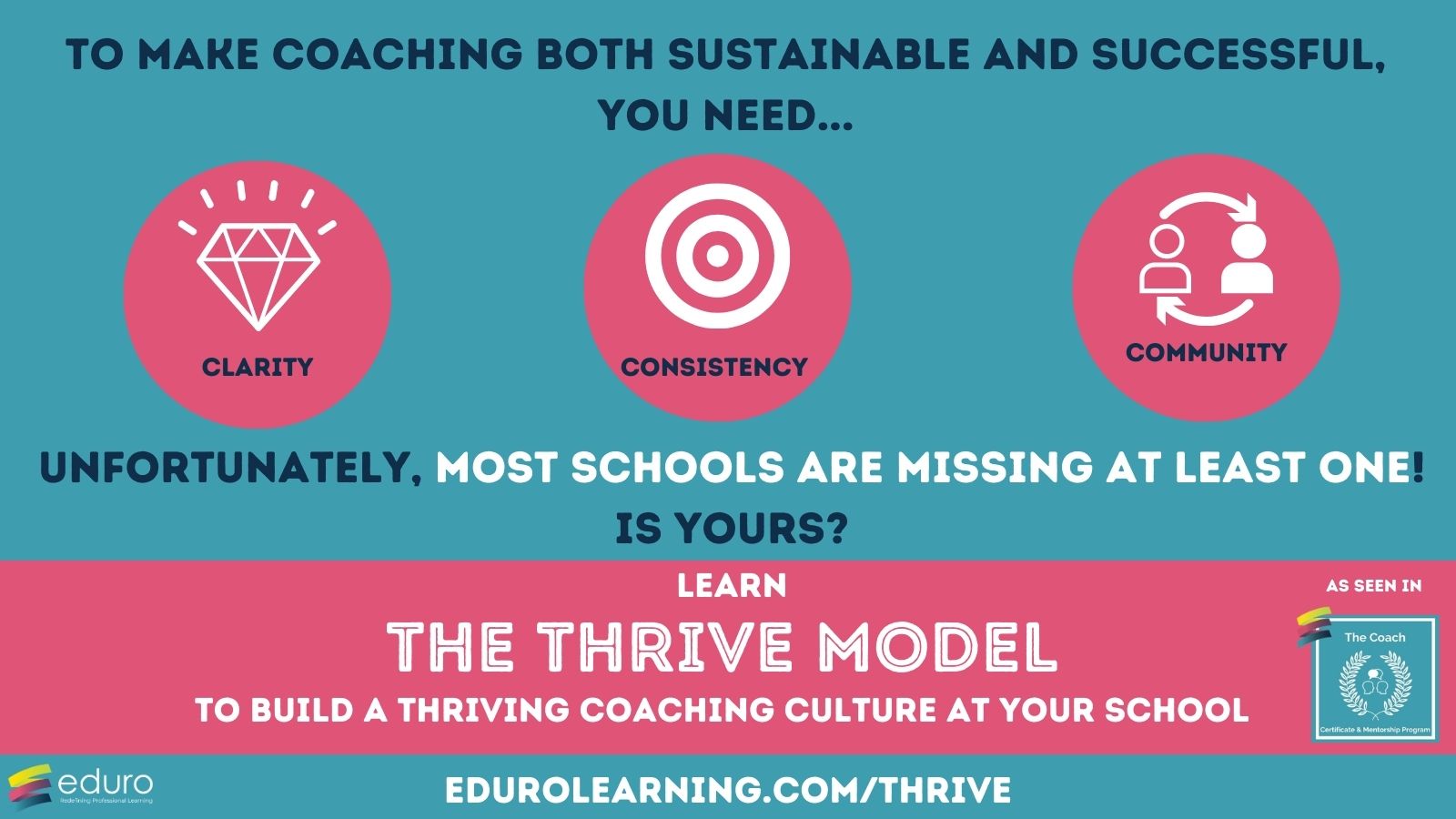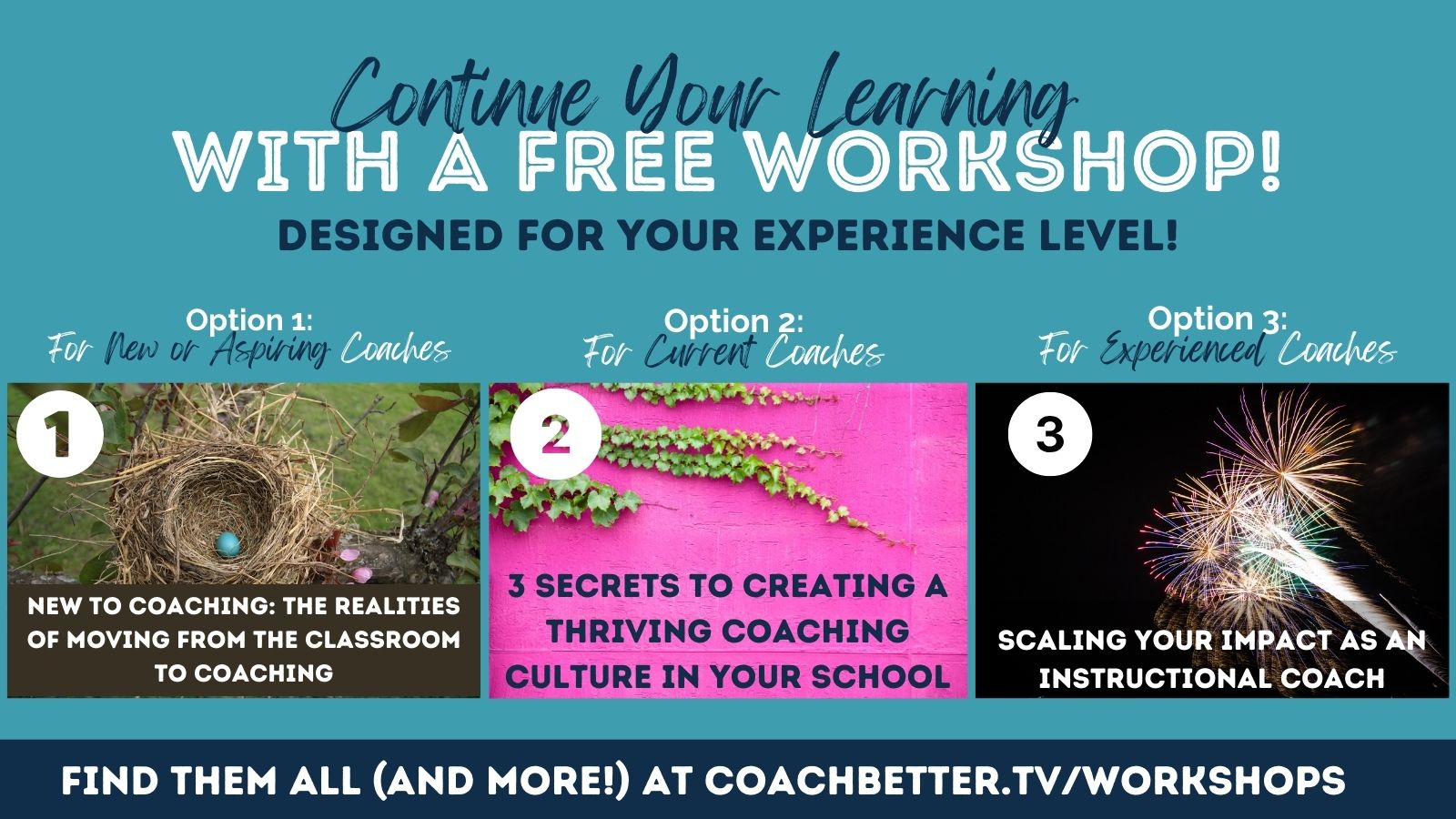It can be easy to think that once you launch your coaching program, that’s all it takes to be successful. You launch it and you start coaching, right?
But the reality is that it takes continued communication, reflection and refinement over time to build a program that is both successful and sustainable in your school setting.
That’s why we’re sharing this highlight from one of my favorite episodes from a previous season. If you’re a longtime #coachbetter listener, you know how valuable it is when we get to hear from current school leaders who have formerly been instructional coaches.
This conversation is from one of those very special episodes, with Samantha Olson-Wyman and Stephanie Cifuentes, both former instructional coaches, and currently senior leaders. This highlighted clip shares insight into the work that the instructional coaches at the American School in Guatemala do every year to continue to grow the success of their coaching program.
This episode has 6 specific structures that the coaches at CAG repeat year after year – and I’m sure there’s at least one you can take away and apply in your school setting this year!
If your goal is to be more intentional and strategic in your coaching practice and program this academic year, you will love the Thrive Model for Sustainable Instructional Coaching!
EXPLORE THE THRIVE MODEL
Are you working on building a coaching culture in your school setting?
To make coaching both sustainable and successful, you need clarity, consistency, and community.
Unfortunately, most schools are missing at least one! Is yours?
Use the Thrive Model to find out!
Developed after working with hundreds of coaches and leaders in international schools around the world, the Thrive Model incorporates both the macro view of a coaching program, and the micro view of a coaches practice, to bring together the three essential elements to make coaching both sustainable and successful.
Explore all of our resources about the Thrive Model at edurolearning.com/thrive

6 Structures to Repeat (year after year)
If your goal is to be more intentional and strategic in your coaching practice and program this academic year, this episode is for you – and stay tuned until the end to see how you can put all of this into practice in The Coach Certificate and Mentorship Program!
1: The Launch
As Stefanie says:
“We can’t launch the same way every year because it becomes dull. Coaches are always looking for creative ways to launch”
The CAG team uses a variety of strategies including:
- formal presentations walking through the steps of a coaching cycle or conversastion,
- testimonials,
- panels,
- mini-super intense personal reflection engagements (modeling coaching)
2: Coaching Cycle Dates:
Because CAG has a dual language approach with literacy, in Lower School they have different timings for Readers and Writers Workshop as there are for math. Although they tried having different cycle lengths in different content areas, it didn’t work as well for them. Now they try to have common start dates.
3: New Teacher Onboarding
When new teachers arrive in Aug, the CAG team offers coaching specific support to help them build understanding of the coaching program. They include choice boards, mini coaching cycles and classroom visits
4: Supporting Section Specific Needs
In Secondary coaches focus on embracing the needs of the section (MS vs HS). They pay attention to the goals of each section with the support of divisional leadership.
5: Partnership Around Professional Learning
In all divisions, coaches are partners in developing professional learning. In LS coaches help create the PD vision, they inform, share feedback, and how we should get there. Admin are looking forward to having a partner in professional learning.
6: Data Collection
Coaches focus on collecting data on coaching cycles and using that to see how effective coaches work. They conduct an end of year survey with reflective questions (what were big takeaways, what are different approaches faculty would like to see). They also collect data on who’s participating in coaching cycles throughout the year. In Secondary, this might look like different grade levels taking advantage of coaching or different subject areas, so coaches can find opportunities to support specialists.
Follow the Thrive Model
It’s always helpful to hear the specific ways that coaches do this in their unique setting, because every coach needs to find exactly what works in their school community. We talk about many of the examples highlighted in this episode in The Coach Certificate and Mentorship Program – because these are things that are going to work in many different school settings.
In The Coach, we work through the Thrive Model for Sustainable Instructional Coaching so you are focused on building a coaching culture within your school, while you’re developing your coaching practice as an individual coach. We use the three phases of the Thrive Model: Clarity, Consistency and Community, to help you reflect on your practice and program from both a macro and micro lens, with a systems view to ensure you’re building in sustainability from the start.
Our global cohorts open only once a year (and it’s coming up soon!) – get all the details and join the waitlist for our next cohort at edurolearning.com/coach
Watch the Video
Keep Learning
If you’re ready to dig deeper into being more intentional in your coaching practice – or if you’re new to instructional coaching and you’re curious about getting started, join us for one of our courses for coaches!
We have programs to support you in every stage in your journey. From new coaches moving from the classroom to a coaching role; to current coaches ready to be more intentional and strategic in their practice, to experienced coaches, ready to lead. Find them all at coachbetter.tv/learn
Free Workshops for Instructional Coaches
If you’re ready to keep learning, try one of our FREE workshops where you’ll be able to dig deeper into the concepts in this post, and get a peek at all of our courses for coaches.
We have workshops (and courses) to support coaches at every stage of their career: from new and aspiring coaches making the move from classroom to coach; to current coaches ready to be more intentional and strategic in their practice; to established coaches leveraging their coaching experience to lead.

You can them all on our coachbetter website at coachbetter.tv/workshops
If you’re curious right now, you have questions, please reach out. You can leave a comment below, join our #coachbetter Facebook group, or find us on social media at Eduro Learning and send me a DM. I’d love to support you on your coaching journey. See you next time!
Connect with us!
Subscribe to the podcast iTunes |Spotify|Stitcher
Follow us on social media: Instagram |LinkedIn
Join our #coachbetter Facebook group

Recent Comments